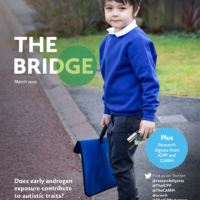ACAMH Website Content Types
-

Conflating risk and mental illness
In this thoughtful article, a young person, Anna, reflects on her experience of risk being conflated with mental illness in child and adolescent mental health services (CAMHS), highlighting crucial lessons for clinicians, commissioners, and policy makers.
Read more -

Complex PTSD in young people in care
Aishat Hamzat, Rachel M Hiller and Helen Minnis discuss what research tells us about the mechanisms underlying complex PTSD symptoms experienced by young people in care. They consider implications for treatment and broader support provided for these young people
Read more -

Are ACE scores useful for identifying individuals at risk of health problems?
Clinics are increasingly screening for ACEs, but ACE scores may not tell us who will go on to develop poor health, explain Jessie R Baldwin (pic) and Andrea Danese.
Read more -

Do autistic girls talk differently about social groups?
New data, published in the Journal of Child Psychology and Psychiatry, suggest that pronoun use during natural conversation might inform us about clinically meaningful social function.
Read more -

Genetics research informing mental health care
Anita Thapar discusses that genetic studies of mental health have revealed important insights about the influence of genes and the environment, and the nature of disorders. She explains how these insights could improve mental health care for young people and their families now and in the future.
Read more -

Do autistic girls have better communication and interaction skills than autistic boys?
There is ongoing debate as to whether autism spectrum disorder (ASD) differentially affects males and females. Several meta-analyses have found little difference between males and females with ASD in terms of social communication and interaction skills. However, such analyses have often relied on diagnostic instruments such as the Autism Diagnostic Observation Schedule, Second Edition 2 that may not be sensitive to how autism presents in females. What’s more, many have been based on global scores, that reflect overall social communication and interaction skills, which could miss subtler differences in specific domains.
Read more -
Cognitive inflexibility contributes to both externalising and internalising difficulties in ASD
Children with autism spectrum disorder (ASD) commonly experience internalising and externalising symptoms, but the underlying cognitive mechanisms are unclear. In their latest study published in the Journal of Child Psychology and Psychiatry, Ann Ozsivadjian and colleagues examined the role of three cognitive factors that might contribute to these difficulties. Specifically, they hypothesized that intolerance of […]
Read more -

JCPP Annual Research Review Editorial: Volume 62, Issue 05, May 2021
Editorial: “‘In our time’: Has the pandemic changed the way we write and read mental health and neurodevelopmental disorder research reviews?” by Sara R. Jaffee
Read more -

March 2021 – The Bridge
This issue includes an excellent article on mood disorders in autistic young people, written by experts Dr Emily Jackson, Dr Eleanor Smith, and Dr Aditya Sharma. The authors thoughtfully discuss the overlap between these conditions, challenges in identifying their co-occurrence, and adaptations needed for interventions.
Read more -

Is frontoamygdalar connectivity in the resting brain linked with externalising behaviours during development?
Externalising problems tend to vary over the course of development, but often peak in late adolescence. Data suggest that the frontoamygdalar brain circuitry (involved in emotion regulation) might have an important role in mediating externalising behaviour.
Read more